- Home
- Rosanne Hawke
Zenna Dare Page 5
Zenna Dare Read online
Page 5
Caleb doesn’t answer at first. ‘Yeah, but he never got over it — being separated like that. They managed to find where they’d been taken from but they couldn’t communicate at first with their own people. And their mum had died. With a broken heart, most probably.
He was okay in the bush. Would go bush a lot, but it wasn’t his own place and he knew it. There was never that spot with his name on it. And there should have been. He just couldn’t live in between.’ That’s all Caleb says, but I can tell his uncle suicided. I don’t ask any more; it’s too awful. How many people know all this? Do Dad and Steffi? In Australian studies last year I don’t remember picking all this up. Too busy dreaming about Ben Walker instead.
Caleb turns to me. ‘I told you that because it’s only through knowing where she’s come from, finding her real family again, that Mum has survived. She doesn’t hold a grudge now. That’s why it’s important for you to find out what’s in that box.’
He’s moved closer, close enough to hold my hand but he doesn’t. ‘Honest, Jenefer. I’ve seen it with our mob. The more they know about themselves, the better they can accept others.’ Just the way he’s saying it is making the box seem important too. In the light of his mum’s story it had begun to pale in comparison.
‘Have you told other people this?’ Maybe if he has that would explain his acceptance at school, though I’ve noticed it’s only the people who know him well who do accept him, like the guys who play sport. Even Erin has a few reservations. ‘Old-fashioned’ is one of the surprising phrases she’s used in relation to Caleb, though I wouldn’t have called it that — more a lack of awareness of little things that cool people think are important. But he shakes his head. ‘Not everyone wants to know, Jenefer. And even if we do tell people, it’s like seeds on stony ground — only a few take root.’
‘Why did you tell me?’ I whisper.
His head is down, looking at my hand. I’m staring at the black curls straying past his collar like corkscrews and suddenly I want to reach out, see if they feel springy, but I don’t dare. He touches my hand. ‘Because I think you’d care.’
‘You can’t know that.’ Alicia fleetingly comes to mind. How does he know I’d be any different? I don’t think I am. Surely she’d be upset too if he told her his mum’s story. He’s still touching my hand. Running his finger down my thumb. It’s gentle and feels sharp like electricity at the same time.
‘It’s just something I can’t explain. A feeling I get — a look in someone’s eyes. A quick flash on their face that says what they’re thinking.’ He glances across at me. ‘It’s not so weird. When you’ve lived with knowing people mightn’t think the best of you, you get to know who will.’
‘So you can tell what I’m thinking?’ I’m trying to grin, but he’s still serious.
‘Sometimes.’
I’m getting worried that he’s not smiling. Has he caught on that I never understood anything about his people before? That I’ve lived here all my life; my people have lived here for generations, and I wasn’t told? What an excuse. I just never bothered to find out. Does it have to take meeting someone like Caleb before stuff like this makes sense? I’m sitting here staring at his fingers stroking mine. How did I get to know him in such a short time? The things we’ve shared? The things Caleb’s said that I’ve never heard anyone else say?
‘Jenefer,’ he says finally, ‘your story is important too. Don’t ever think it isn’t.’
It’s night. I’m staring up through my ground-level window where I can see the moon sending its laser beams of pale light. If I half close my eyes I can almost see the faeries sliding down, right into my room. It’s incredible what this room has done for me. I still miss my friends from Cedar Rise but I can hardly remember what Ben Walker looks like. Whenever I think of him, Caleb rides through my thoughts like they’re trees lining a forest path. It still doesn’t stop me feeling like a twig that’s dropped off its branch and landed splat in the creek. Amy rang tonight. She told me about her subjects — Classics included, of course — and raved on about how much I’d enjoy it. She was shocked out of her brain that I had no choice in mine, well, not much of a one. She invited me to stay with her for the year. ‘It wouldn’t be hard, Jenny, and you could go back for holidays.’ She sounded as if there couldn’t possibly be anything in Kapunda for me. It made me cry after. I tried to explain to her about my room. I stopped at the box, and suddenly realised there’s no way right now I could leave that. Nor could I explain what Caleb is like. He has this energy, sort of wild, but he’s gentle too. You can see it in his eyes, in his hands. Amy and I used to tell each other everything but I didn’t tell her Caleb was a Nunga. I wasn’t sure she’d understand.
Tonight I have to force myself to do some homework. There’s so much other stuff crowding my mind. If I research Zenna Dare as my History independent study, I can kill two birds with one stone. Now I come to think of it, if I did it all on the web, I could get IT credit too. Even write something up for English. I didn’t get away with doing three subjects. Only in special circumstances, I was told. It makes me wonder what special circumstances Caleb has.
At least History is better than what I thought. I would rather have done Classics and it still annoys me but I haven’t complained too much lately to Dad. This semester the history is South Australian and it’s good for me that Ms East is encouraging us to use local history for research. I’ve read some of my English novel, an old one by Thomas Hardy about a girl called Tess. Bit depressing so far. She has no control over anything that happens in her life. Worse than being dragged off to Kapunda even.
Now I do what I’ve been dying to do all day: I open the box again. This time I’m ready. Caleb reckons the box has been left for a reason. I think he’s right. No one would leave a box like this filled with personal effects without hoping someone would find it. Otherwise they would have burnt the things. I want to know what Gweniver was like and find out who Zenna Dare was. There’s an absurd idea like the beginning phrase of an elusive tune trying to take root in my head but I have to prove something first before I can give it room to develop.
I put the photo of Gweniver in a spare photo frame by my bed. Now she’s where she should be where relatives (that’s me) can see her. At this point I’m feeling too nostalgic to care about Kate’s inquisitive habits. Besides, I can put it in my drawer whenever I go out. Then I take out the leather case of papers. The box has an ink bottle, long ago dried out, and a place to put the pen. Must have been a dip pen, that long ago. When the lid lifts up there’s a blotter on the inside of the lid and a surface to write on. In a hollow space under this are the papers. They’re not in order, and I can tell it’s going to take too long to work out what comes first; they’re not all dated. Some are just poems, some look like letters, or journal writing on sheets of paper. Some of the paper looks like it was ripped out of a book to be written on. The ones torn in pieces will have to be left for last. The ink is faded so I sit close to the light. It’s hard to decipher and the form of the letters is different from mine. Guess I’ll just read what comes — a bit whenever I can — late at night when everyone’s in bed. It won’t give me much time, but there’s no other way to keep it secret.
The first thing I notice is how sad my great-grandmother is. Oops, 1845 — she can’t just be my great-grandmother. How many ‘greats’ back to 1845? I work it out on a pad. If everyone had most of their kids by thirty-five, and Great-aunt Dorie is my grandparents’ generation, then Gweniver is my great-great-great-grandmother. Totally incredible. What a mouthful! From now on ‘triple-great-grandmother’ will have to do.
O rose thou art sick.
The invisible worm
That flies in the night
In the howling storm
Has found out thy bed
Of crimson joy;
And his dark secret love
Does thy life destroy.
This is written
out in ink and says William Blake on the bottom. Why did she collect such sad poems? I smooth out one of the pages and start to work out what it says.
Gweniver
Camborne, Cornwall, 1845
Sweet rose, fair flower, untimely pluckt, soon faded,
Pluckt in the bud and faded in the spring!
Bright orient pearl, alack, too timely shaded!
Fair creature, kill’d too soon by death’s sharp sting!
Like a green plum that hangs upon a tree
And falls through wind before the fall should be.
‘The Passionate Pilgrim’,
William Shakespeare 1564–1616
How I have been plucked. I am the one who should be dead. If only I could turn back the sun’s rising, back to the heady joys and simple pleasures of childhood. Learning the lute at grandmother’s knee; singing those simple songs ‘Trelawny’ and ‘Pretty Little Mermaid’. What a memory I had for words. Grandmama would sing a song once and then I could remember it the next day. Nor did it take me long to learn the lute, even though I quailed when I first counted all those strings. Mama was always so pleased when I played, though Da would grumble. ‘Look ’ere,’ he would say, ‘the child should be learnin’ to make pasties.’ But I already knew how to make pasties, how to make the onions stretch when there was no meat. Lute playing was more of a challenge.
Gladys would go on at me if ever I ran and washed my hands between putting loaves in the oven, just so I could play and sing. Not even sweet Mary seemed to understand the force that drove me like Da’s shirt flying in the northern wind. I could no more stop singing than that shirt could stop flapping. We all went to school. Mama saw to that; another thing Da grumbled about when his friends’ daughters were bal maidens, preparing the ore, while we learnt our letters and embroidery. But Mama was adamant, ‘No daughters o’ mine will be missin’ out on fine chances because of a lack of “edication”.’ I never realised they both worked harder because of it, until Clarice and Gladys took ‘positions’.
Perhaps Mama’s educational idea was because
we were not as beautiful as some. I can remember Grandmama, before she died, telling Mama that with a face like hers, Annie Trengove would never need to go to school. I was glad I was ugly enough for school, then. Once I realised I could read, I knew anything was possible. No matter we never heard the sound of a bird singing for the constant thump of the mine engine, I could visit other worlds, hear their birds sing in books. I soon learnt that the musical tongue my parents spoke was not the language of school. The shame of not knowing the proper words gradually passed as I practised saying my aitches where I should and removing them where they should not be; saying ‘you’ instead of ‘ee’. Words, English words, were magical and I respected them for the power they held.
Yet even with the reading, many things were not explained. We learned the important things as time went by, until suddenly one was grown up and one miraculously knew what to do. That is how I understood life. I know now I was naive, but that day when Mr. Drew was passing through Camborne, I was sixteen and I knew all there was to know. Da still had not walked home from the mine, and I had escaped for a short while with the lute. In a field at Pen Ponds I was, playing and singing some simple song, ‘Maggie May’, most like. I saw the young gentleman pass by; he barely hesitated. How much he had heard before he came into sight I could not tell. But I knew it would not do to be seen idling away minutes with a lute so I stopped playing at once and hurried the quarter-mile back to the cottage.
It was later that it all happened. The March Fair, a celebration on the common; Da said we could all go. The first Friday of March was always a holiday for the mine. Perhaps we had St Piran to thank for that. Clarice and Gladys fussed over the little ones; Mary and I were left to ourselves to get ready. I was looking forward to the fiddlers and dancers, the pedlars with things to sell we had never seen before. When we arrived, the dancing had already started on the green and we quickly joined in. The young gentleman was there too in his blue dress coat and narrow breeches. I had never seen him before he passed the field, but here he was in front of me, dancing, with almost a smile curling on his lips. I tried not to notice and I did not smile back for we had not been introduced.
Soon it was announced there was to be a prize given. The sweetest song from a young lady would win her lessons with a singing master in Penzance. There had always been music booths at fairs but I had never sung in them before. I closed my eyes with the pain of it. Singing lessons. Did I dare hope? A desperate fluttering started up in my middle; I could hardly speak clearly when I sought out my mother.
‘May I, Mama? Sing in this public place?’
My mother was a bumble bee that had just flown into a field of bluebells. ‘Of course, child. Your one chance, this may be.’ I was touched. With the Cornish knack of putting first in the sentence what was most important, my mother had shown me she knew what lay so heavily on my heart.
‘And Da?’
‘Later. To ’un I will be explainin’.’ I felt the fear then mixed in with the other trembling. Perhaps this was not the right time? Da would not approve, I knew that, but Mama pushed me from behind. ‘Get on with ’ee, your grandmama didn’t die leavin’ ’ee that lute and voice so ’ee be doin’ nothin’ with ’em.’
When I went to the Master of Ceremonies to register, the young gentleman was sitting at the table writing down all the names. He looked up as I came close; his eyebrows rose and I knew he recognised me, perhaps even from the field in Pen Ponds. So close he did not seem as young as I first thought. I felt that unreasonable lurch in my innards again, but I explained it away as excitement.
Agonising it was, waiting for my turn. Some girls even sang ‘Trelawny’. I had realised by now that it was the gentleman who would be choosing; he listened intently to every song, nodded, but never completely smiled. He did not look like the type of man to be moved by Cornwall’s folk tunes. I chose ‘Lamorna’, a more worldly type of song to impress a gentleman from Penzance. Penzance. He may as well be from London.
When it was finally my turn, I sang well enough after the first few words; perhaps not quite as well as I could in the field. It was terribly disconcerting having so many hear me who were only used to seeing me sing Wesley’s tunes in Chapel. When all had finished, the gentleman looked down at his paper and wrote a name. Looking back now, ’tis easy to see he decided too quickly. But I did not notice that then, no one did, not even Da, who seemed resigned to be pleased for me after all.
‘Though I doubt ’ee’ll be able to make a living from singin’, child. Best take good note of what the teacher tells ’ee, so ’ee can teach it ’eeself one day.’
There was only a night to say goodbye. I was to travel with Mrs. Moyle who was to get me settled into a boarding house. Penzance was almost fifteen miles away; I would miss the Whit-Monday picnic, even Midsummer. Why, I might not be home again before Christmas.
I can still remember that song I sang at the fair:
This song I’ll sing to you —
It’s about a maiden fair,
I met the other evening
At the corner of the square;
She’d a dark and roving eye
And her hair was covered over,
And we roved all night
In the pale moonlight
Away down to Lamorna.
Jenefer
I have to see Great-aunt Dorie. Nothing seems quite so important any more as Zenna Dare or my triple-great-grandmother. Nor have I told Dad about the box. I just don’t want to lose it — it could end up in the Kapunda museum. Or, at best, in the lounge where Kate will find out all its secrets, and I feel like I need to know more before I can cope with that invasion. I can almost understand what Caleb talks about as sacred things in his culture.
Ms East approved this as a local research project for my independent History assignment. I’ll
call it Zenna Dare. I just hope my instincts aren’t wrong and there actually is something to research. English — I sure would have written the end of Tess of the d’Urbervilles differently from Thomas Hardy. But then, I didn’t live in the society he lived in. Were people all that much different? Thomas Hardy is Mr Mayes’s passion. There was no chance for Tess to redeem herself, he reckons. It’s so unfair; the first guy was a sleaze date-raping her like that and Angel Clare was such a hypocrite. But she couldn’t see any of it coming. ‘One day she was pink and flawless, the next tragical.’ At least Hardy tries to make the reader think about it, like was ‘once lost always lost’ really true of chastity? ‘Is maidenhood’ (the ancient word for virginity, would you believe) ‘the only part of the body denied healing power?’ In a case like poor old Tess, it certainly wasn’t for a lack of wishing it back. At least I’m getting ideas for the first essay.
The kitchen is too quiet for Saturday when I get up there. Well, not quite: Hamilton is sniffing. I thought he’d be happy, going down to the shops with Steffi and Kate.
Caleb’s taking me to the home where Aunt Dorie lives. For once he’s not working at the farm. It feels like a date. Kate wanted to come too. Dad thought that would be a good rest for Steffi, but I put my foot down. I can, when there’s something I want badly enough. Steffi came to my rescue; don’t know if she truly needed to take Kate for school shoes or if she thought I needed what she calls a ‘lift’. It placated Kate at least and Hamilton gets to go too.
I ruffle Hamilton’s hair a bit. ‘So what’s wrong?’ What usually bothers a seven-year-old? A lost toy? A friend doesn’t like him anymore? That’d get fixed up the next day, wouldn’t it? But Kate answers for him. ‘It’s Sher Khan.’ She doesn’t sound upset so I don’t catch on at first. Then I see Steffi give her a warning glance, just as Kate opens her mouth. She shuts it again.
‘He’s sick.’ I hardly hear Hamilton’s mumble and I give Steffi a questioning glance. She shrugs. ‘Not much you can do with little rabbits.’ She says it low but Hamilton must have heard — he runs back to his room. At this point I hear the ute round the back and Caleb comes to the kitchen door, ready to take me to Gawler. Just like I did, he senses the atmosphere in the room.

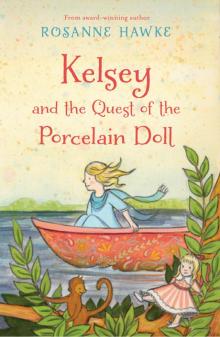 Kelsey and the Quest of the Porcelain Doll
Kelsey and the Quest of the Porcelain Doll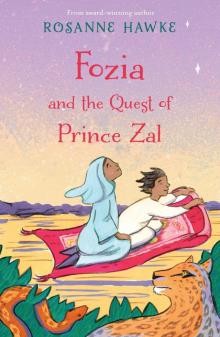 Fozia and the Quest of Prince Zal
Fozia and the Quest of Prince Zal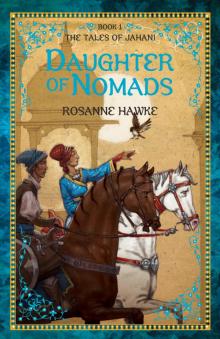 Daughter of Nomads
Daughter of Nomads The Truth About Peacock Blue
The Truth About Peacock Blue Taj and the Great Camel Trek
Taj and the Great Camel Trek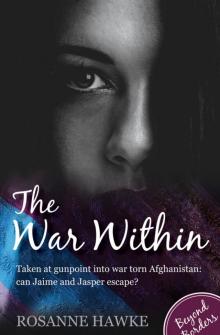 The War Within
The War Within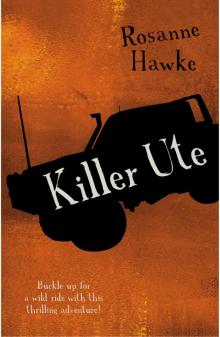 Killer Ute
Killer Ute Shahana
Shahana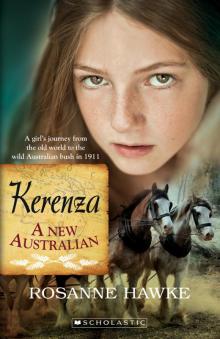 Kerenza: A New Australian
Kerenza: A New Australian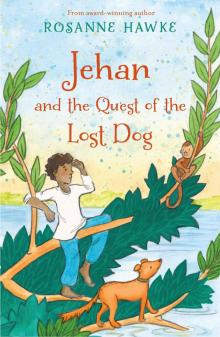 Jehan and the Quest of the Lost Dog
Jehan and the Quest of the Lost Dog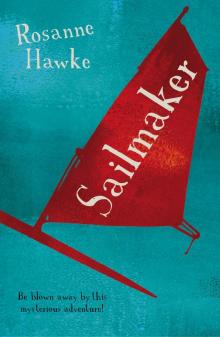 Sailmaker
Sailmaker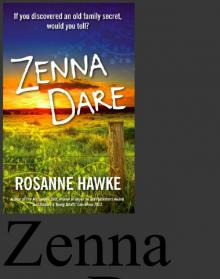 Zenna Dare
Zenna Dare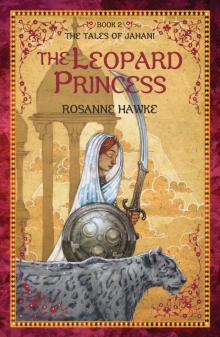 The Leopard Princess
The Leopard Princess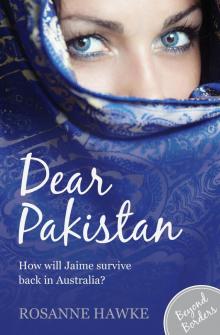 Dear Pakistan
Dear Pakistan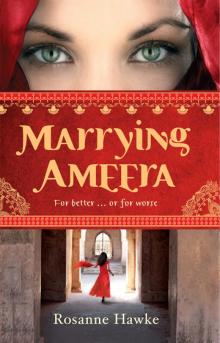 Marrying Ameera
Marrying Ameera Finding Kerra
Finding Kerra Spirit of a Mountain Wolf
Spirit of a Mountain Wolf